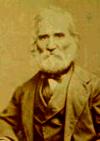Biography

Auguste Blanqui (1805-1881) was nick-named "l'enfermé" because over half of his adult life was spent in jail. He is remembered as an activist, an insurgent, involved in abortive insurrectionary movements in 1839, 1840, and 1870.
Blanqui's father, a Tuscan lecturer in philosophy, embraced the French Republic and became a Napoleonic prefect. Auguste attended the elitist lycée Charlemagne and joined the charbonnerie. He studied law, wrote for the Globe and took part in political demonstrations during Charles X's reign and in July 1830, for which latter activity he was rewarded with the croix de juillet. Disenchanted with the Orleanist monarchy, he tried to organize discontented law students into an association, joined the short-lived national association in the spring of 1831 and enlisted in the Amis de Peuple. In July 1831 he was arrested and briefly imprisoned for violations of the press laws.
This trial was the occasion for Blanqui's first public statement of his socialist republican ideas. For him a republic was the route to an egalitarian society. He was one of the first to argue that the motive force for change was a class antagonism between an all-possessing bourgeois elite and an impoverished, and therefore revolutionary, proletariat. The insurrectionary catalyst was to be a vanguard party and like earlier republican conspirators such as Babeuf and Buonarroti, Blanqui assumed that the disadvantaged were already republican and would automatically join his followers in revolution.
In between short jail sentences Auguste continued to run and write for minor opposition papers. When the law against associations forced most clubs to close in 1834, he became a leader of the families, a society organized in tiny cells or "families." No minutes of meetings were to be kept and members had to promise to be willing to fight for a social revolution. By the summer of 1836 there were about 1,200 members, mostly young, and predominately artisans, negoçiants, and students, with some junior army officers and national guardsmen. An informer led the police to a store of the familes' weapons, ammunition, and membership lists. Blanqui was sentenced to two-years' imprisonment, a fine of 3,000 francs, and two years' subsequent police surveillance.
An amnesty for political prisoners announced to celebrate the marriage of the duke of Orléans in May 1837 allowed Blanqui to set up the seasons. Acolytes swore: "In the name of the Republic, I swear eternal hatred to all kings, aristocrats, and all oppressors of humanity." The monthly subscription was a modest 50 centimes and a high proportion of members were artisans, especially tailors. By the beginning of 1838 they numbered 900, meeting in small, inconspicuous groups on Sunday afternoons in a variety of spots, mainly cafes.
Painstaking plans were laid for a rising on Sunday May 12, 1839 at 2:30 p.m. The coincidence of an economic recession with a prolonged ministerial crisis may have convinced Blanqui that circumstances were similar to those of July 1830. The prefecture of police and the main bridges were to be seized, enabling the plotters to hold the right bank of the Seine from the Marais to Montmartre. A proclamation prepared for the occasion announced a people's republic: "The hour of doom has struck for our oppressors. People arise!"
Only the main leaders knew of the project. In the previous weeks weapons and up to 12,000 cartridges had been stockpiled. Weapons were to be seized by raids on armorers' shops once the rising was under way. Assaults began on key installations. Barbès himself led a column of 600 men to the Palais de Justice where he urged the troops on duty to join him. A refusal led to fighting. The guard-post at the palais succumbed, but the troops at the prefecture opposite resisted and reinforcements were brought in. Meanwhile, Blanqui took the nearby Hôtel-de-Ville, but was soon in combat with the municipal guard for control. Men were sent to take control of the mairies of other Paris districts. Barricades went up in the artisan quarters of St. Denis and St. Martin and in the Temple area. Armories were sacked by the rebels. However, they were met by fierce resistance from the troops, who by 11 p.m. had reestablished control. About 66 rebels were killed, or died from their wounds, including five women and 28 on the government side. Within twenty-four hours nearly 300 arrests had been made, the final total reaching almost 700. Blanqui and other leaders spent the remaining years of the constitutional monarchy in prison.
In 1848, fresh from jail, Blanqui was hailed as a radical leader, along with his fellow conspirator Barbès. Two of the most substantial clubs which sprang after the February revolution were Barbès' Club de la Révolution and Blanqui's Société républicaine centrale. The two were now enemies, each blaming the other for their failure in 1839. Like other radicals, Blanqui was soon to be disappointed by the election of a large majority of former monarchists to the constituent assembly. He was equally disillusioned by the failure of the provisional government to do more than provide a dole for the ten thousand or so unemployed who had signed on in the national workshops after the revolution. On May 15, a radical demonstration of 20,000 led by Blanqui and Barbès occupied the new assembly, ostensibly in support of the Poles, in reality to seize power. Speedy arrest and imprisonment until 1859 were the only rewards. Renewed opposition led to another jail sentence (1861-65), followed by exile in Belgium until the fall of the empire in 1870. Two hopeless attempts to declare a radical republic in the autumn of 1870 meant jail until 1879, although his supporters were vociferous in the Paris Commune of 1871.
Blanqui was to become an international star when Lenin recognized a debt of gratitude to him in developing his own theory of the "vanguard" party. From the 1920s, the two insurgents were subjected to almost more historical investigation in Russian than in French.
Pamela M. Pilbeam
Source: James Chastain